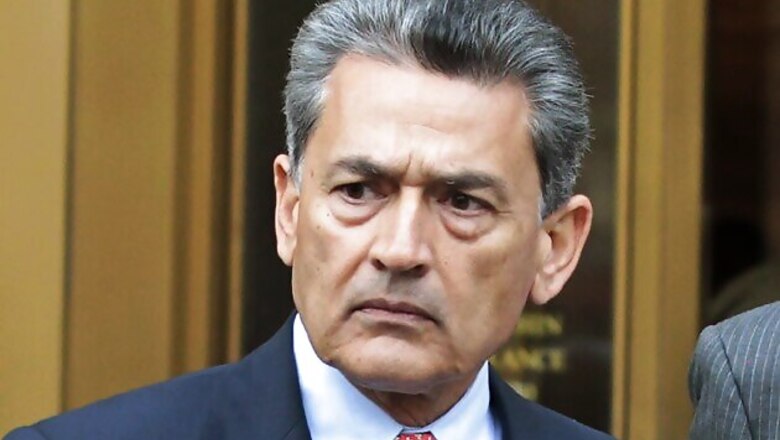
views
New York: The US government has asked a court in New York to slap a maximum penalty of $15 million on India-born fallen Wall Street titan Rajat Gupta and permanently bar him from serving as director of any publicly-traded firm for his "terrible breach of trust" by indulging in insider trading. Weeks after the former Goldman Sachs Director was handed down a two-year jail term and fined $5 million by US District Judge Jed Rakoff, the US Securities and Exchange Commission (SEC) said he should be ordered to pay a maximum civil penalty of $15 million, which would be thrice the $5 million in gains and losses avoided as a result of his "illegal conduct".
Gupta, 63, who is set to begin his prison term in January, has filed an appeal against his conviction in the US Court of Appeals for the Second Circuit. According to the Notice of Appeal filed by his lawyer Gary Naftalis in US District Court Southern District of New York, Gupta's "appeal concerns conviction only."
Apart from the criminal case filed against him by Manhattan's India-born federal prosecutor Preet Bharara, Gupta faces charges filed by the SEC of "abusing his position of trust" and passing confidential information about Goldman Sachs and Proctor and Gamble to now-jailed hedge fund founder Raj Rajaratnam. "The court should impose the maximum three-time civil penalty of 15,096,585 dollars to punish Gupta for his terrible breach of trust and his craven, criminal conduct and to deter others from engaging in such conduct in the future," the SEC said in a motion filed in federal court here.
The Commission has also sought an order permanently enjoining Gupta from future violations of the federal securities laws, barring him from serving as an officer or director of any publicly-traded company, barring him from associating with any broker, dealer or investment adviser and disgorgement of all ill-gotten gains received as a result of his illegal actions. "Gupta's conduct was far more egregious than that of the vast majority of defendants convicted of insider trading and warrants maximum penalty under the law," the federal regulator said. "He betrayed the enormous trust and confidence bestowed upon him in the most egregious manner possible."
The SEC argued that despite his conviction, Gupta would still have a "lifelong" network of friends and business associates in the US and abroad and with their help, he would be able to create for himself or be offered business positions that "make him privy to corporate secrets". Gupta, who produced over 400 letters of support, including those by Microsoft founder Bill Gates and former UN chief Kofi Annan prior to his sentencing, would continue to have access to highly placed corporate insiders, the SEC said.
"The danger of his access to material, non-public information still exists. Nothing currently prevents Gupta from using his continuing access to corporate insiders to solicit inside information and trade on it on his own behalf," the SEC argued. Given Gupta's "potentially reduced earning ability" in future in the wake of his conviction, the incentives for him to seek financial gains and prestige would increase.
Further, Gupta has maintained throughout that he has done nothing wrong and has not accepted responsibility for his misconduct, the SEC said. "Given his failure to acknowledge that he did anything wrong, there can be no assurances that he will not engage in the same misconduct in the future. A permanent injunction against Gupta is necessary to protect the public interest," the regulator said. The SEC complaint charges Gupta with disclosing to Rajaratnam Berkshire Hathaway's September 2008 investment of $5 billion in Goldman Sachs, Goldman's second quarter financial results in 2008 and Proctor and Gamble's January 2009 earnings release.
















Comments
0 comment